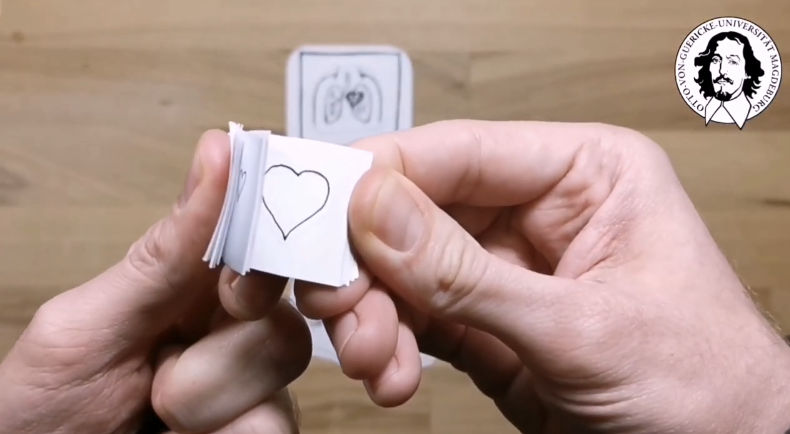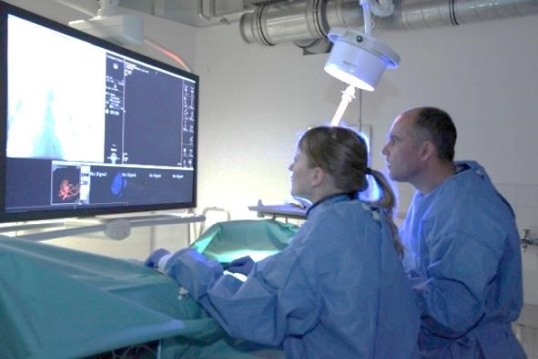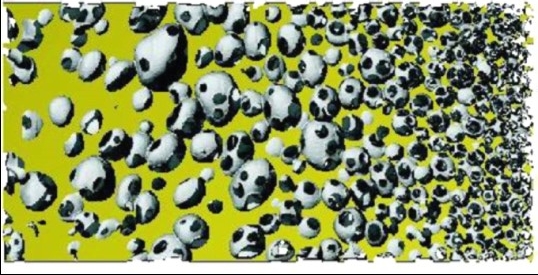Postal address:
Otto-von-Guericke-Universität Magdeburg
ESF-GS MEMoRIAL
POB 4120 / Universitätsplatz 2
39106 Magdeburg, Germany
Phone: +49(0)391-67-58540
Fax: +49(0)391-67-41133
The international Graduate School for
Medical Engineering and Engineering Materials
funded by the European Social Funds (ESF) as part of the European Structural and Investment Funds
under the programme “Sachsen-Anhalt WISSENSCHAFT Internationalisierung"
from Sep-1, 2016 to Jun-30, 2022
linked up two cutting-edge research fields at the Otto von Guericke University (OVGU) Magdeburg in order to synergise


Medical imaging encompasses a versatile toolkit of methods to generate anatomical images of a single organ or even the entire patient for diagnostic and therapeutic purposes. Radiation-based imaging technologies are of inestimable importance and hence performed in daily clinical practice.
Electromagnetic radiation may, however, cause undesirable side effects. Consequently, methods allowing for dose reduction are expected to prospectively come into focus. This may specifically hold for patients, who need to be scanned periodically for therapy and/or health progress monitoring.
Instead of performing an entire scan per session, prior knowledge derived from preexisting multimodal image data sourcing, anatomical atlases, as well as mathematical models may be integrated — the latter reducing radiation dose and scan duration thus finally saving health expenditures.
In order to do so, available images and data need to be updated based on newly acquired subsampled data.
The application of prior knowledge may furthermore advance minimally invasive interventions by means of intraoperative image acquisition. Within this context, consecutive scans usually show a high degree of similarity while differing only in probe position and respiratory organ motion. Lower radiation loads vs. significant increases in image frame rate may result when spotting those similiarities based on formerly acquired image information.
The integration of prior knowledge therefore holds a great potential for improving contemporary interventional procedures — especially in the field of interventional magnetic resonance imaging (IMRI).
PhD and Master students in medical imaging science, medical engineering or engineering, computer, and natural science got the opportunity to work with high-tech diagnostic devices such as x-ray examination and computed tomography (CT), state-of-the-art single-photon emission computed tomography (SPECT) and positron emission tomography (PET) within a structured 4-year/48-months PhD track or shorter research tracks.
For more details and specific research projects please click HERE.

The availability of novel materials is a key issue for technical innovations not least concering energy conversion, mobility, or medical engineering.
Notwithstanding the immense R&D efforts made with respect to new materials over the last years, there is still an unsatisfactory detailed understanding of the materials' behaviour during, for instance, complex mechanical stress situations or when exposed to high temperature or radiation.
This, moreover, holds true for compact as well as cellular materials.
An integrated approach focussing on the combination of (i) materials processing, (ii) materials design, (iii) complex stress situations in materials, and (iv) mathematical modelling consequently needs to be designed in order to fill this gap.
Although several of these categories are already interlinked with each other, R&D of holistic approaches is still in its early stages, intensifying the challenge to develop integrated models which describe the process-microstructure-properties-relationships of materials of different provinience and porosity and therefore enable feedback between materials design and behaviour.
PhD and Master students in materials science and technology got the opportunity to work with modern processing technologies and high-tech characterisation methods such as state-of-the-art scanning electron microscopy, biaxial testing equipment and several in-situ and combined methods within a structured 4-year/48-months PhD track or shorter research tracks.
For more details and specific research projects please click HERE.

Postal address:
Otto-von-Guericke-Universität Magdeburg
ESF-GS MEMoRIAL
POB 4120 / Universitätsplatz 2
39106 Magdeburg, Germany
Phone: +49(0)391-67-58540
Fax: +49(0)391-67-41133
Sep-5, 2022 [ar]:
Jun-14, 2022 [ar]:
May-4, 2022 [ar] - MEMoRIAL-M2.2: PUBLICATION
May-3, 2022 [ar] - MEMoRIAL-M1.4:
Soumick Chatterjee et al. presenting on the ISMRM-ESMRMB & ISMRT 31st Annual Meeting / 7-12 May 2022 @London, UK
See more ...
Mar-28, 2022 [ar]:
Feb-19, 2022 [ar] - MEMoRIAL-M1.4+M1.2+M1.7+M1.m-10: PUBLICATION
Feb-10, 2022 [ar] - MEMoRIAL-M1.4+M1.m-21+M1.7: PUBLICATION
Jan-27, 2022 [ar] - MEMoRIAL-M1.4: PUBLICATION
Oct-25, 2021 [ar] - MEMoRIAL-M2.3:
Last Modification: 29.12.2022 -
Contact Person: